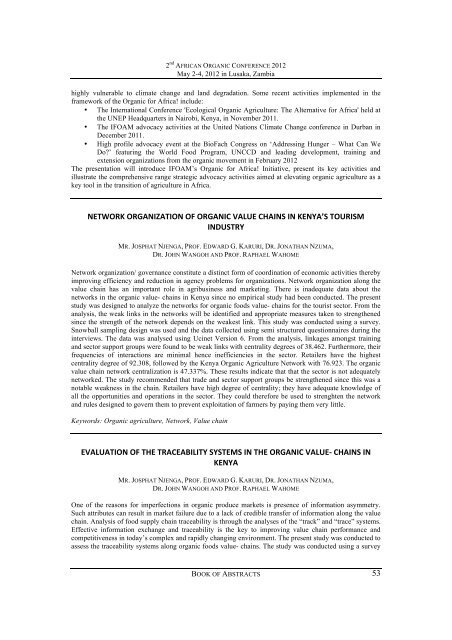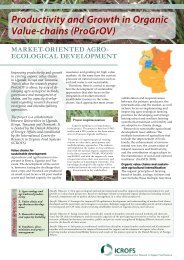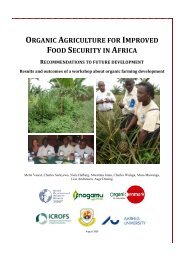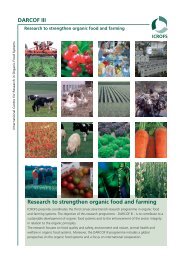The 2nd African Organic Conference â Mainstreaming ... - ICROFS
The 2nd African Organic Conference â Mainstreaming ... - ICROFS
The 2nd African Organic Conference â Mainstreaming ... - ICROFS
Create successful ePaper yourself
Turn your PDF publications into a flip-book with our unique Google optimized e-Paper software.
2 nd AFRICAN ORGANIC CONFERENCE 2012<br />
May 2-4, 2012 in Lusaka, Zambia<br />
highly vulnerable to climate change and land degradation. Some recent activities implemented in the<br />
framework of the <strong>Organic</strong> for Africa! include:<br />
• <strong>The</strong> International <strong>Conference</strong> 'Ecological <strong>Organic</strong> Agriculture: <strong>The</strong> Alternative for Africa' held at<br />
the UNEP Headquarters in Nairobi, Kenya, in November 2011.<br />
• <strong>The</strong> IFOAM advocacy activities at the United Nations Climate Change conference in Durban in<br />
December 2011.<br />
• High profile advocacy event at the BioFach Congress on ‘Addressing Hunger – What Can We<br />
Do?’ featuring the World Food Program, UNCCD and leading development, training and<br />
extension organizations from the organic movement in February 2012<br />
<strong>The</strong> presentation will introduce IFOAM’s <strong>Organic</strong> for Africa! Initiative, present its key activities and<br />
illustrate the comprehensive range strategic advocacy activities aimed at elevating organic agriculture as a<br />
key tool in the transition of agriculture in Africa.<br />
NETWORK&ORGANIZATION&OF&ORGANIC&VALUE&CHAINS&IN&KENYA’S&TOURISM&<br />
INDUSTRY&<br />
MR. JOSPHAT NJENGA, PROF. EDWARD G. KARURI, DR. JONATHAN NZUMA,<br />
DR. JOHN WANGOH AND PROF. RAPHAEL WAHOME<br />
Network organization/ governance constitute a distinct form of coordination of economic activities thereby<br />
improving efficiency and reduction in agency problems for organizations. Network organization along the<br />
value chain has an important role in agribusiness and marketing. <strong>The</strong>re is inadequate data about the<br />
networks in the organic value- chains in Kenya since no empirical study had been conducted. <strong>The</strong> present<br />
study was designed to analyze the networks for organic foods value- chains for the tourist sector. From the<br />
analysis, the weak links in the networks will be identified and appropriate measures taken to strengthened<br />
since the strength of the network depends on the weakest link. This study was conducted using a survey.<br />
Snowball sampling design was used and the data collected using semi structured questionnaires during the<br />
interviews. <strong>The</strong> data was analysed using Ucinet Version 6. From the analysis, linkages amongst training<br />
and sector support groups were found to be weak links with centrality degrees of 38.462. Furthermore, their<br />
frequencies of interactions are minimal hence inefficiencies in the sector. Retailers have the highest<br />
centrality degree of 92.308, followed by the Kenya <strong>Organic</strong> Agriculture Network with 76.923. <strong>The</strong> organic<br />
value chain network centralization is 47.337%. <strong>The</strong>se results indicate that that the sector is not adequately<br />
networked. <strong>The</strong> study recommended that trade and sector support groups be strengthened since this was a<br />
notable weakness in the chain. Retailers have high degree of centrality; they have adequate knowledge of<br />
all the opportunities and operations in the sector. <strong>The</strong>y could therefore be used to strenghten the network<br />
and rules designed to govern them to prevent exploitation of farmers by paying them very little.<br />
Keywords: <strong>Organic</strong> agriculture, Network, Value chain<br />
EVALUATION&OF&THE&TRACEABILITY&SYSTEMS&IN&THE&ORGANIC&VALUE:&CHAINS&IN&<br />
KENYA&<br />
MR. JOSPHAT NJENGA, PROF. EDWARD G. KARURI, DR. JONATHAN NZUMA,<br />
DR. JOHN WANGOH AND PROF. RAPHAEL WAHOME<br />
One of the reasons for imperfections in organic produce markets is presence of information asymmetry.<br />
Such attributes can result in market failure due to a lack of credible transfer of information along the value<br />
chain. Analysis of food supply chain traceability is through the analyses of the “track” and “trace” systems.<br />
Effective information exchange and traceability is the key to improving value chain performance and<br />
competitiveness in today’s complex and rapidly changing environment. <strong>The</strong> present study was conducted to<br />
assess the traceability systems along organic foods value- chains. <strong>The</strong> study was conducted using a survey<br />
BOOK OF ABSTRACTS 53





